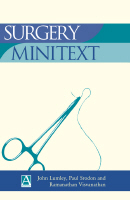Preface
I Principles of surgery
II Surgery in practice
1. Day Case Surgery
2. Preoperative care and assessment
3. Perioperative drug management
4. Consent
5. Anaesthesia
6. Haemostasis
7. Blood transfusion
8. Surgical technique
9. Postoperative care
III Post-operative complications
10. Fluid balance
11. Nutrition
IV Systems management
12. Intensive care
13. High dependency
14. Brain stem death
15. Obesity
16. Elderly patient
17. Palliative care
18. Dying patient
V Management of surgical disease
19. Sepsis
20. HIV
21. Tropical surgery
22. Anaemia
23. Oncology
24. Skin and subcutaneous tissue- Lumps, ulcers sinuses and fistulae
25. Head and neck
Cranial nerves; Face and jaws; Ear; Orbit; Mouth; Nose and throat; Salivary
glands; Neck; Thyroid and parathyroids
26. Breast
27. Thorax- Pulmonary; Cardiac
28. Abdomen- Abdominal wall, hernias and diaphragm; Alimentary tract
Other abdominal viscera; Acute abdomen
29. Genitourinary system
30. Transplantation
31. Vascular- Arteries; Veins and lymphatics
32. Multiple injuries
33. Bones and joints
34. Upper limb- Shoulder and pectoral girdle; Arm; Hand
35. Lower limb- Pelvis and thigh; Knee; Leg and ankle; Foot
36. Spine
37. Peripheral nerves
VI Personal development
Index
About the Author:
John S P Lumley is Director of The Ernest Cooke Vascular and Microvascular
Unit, Department of Clinical Physics, St Bartholomew’s Hospital, London, and
Honorary Consultant Surgeon at St Bartholomew’s Hospital, and Hospital for
Sick Children, Great Ormond Street, London, UK
Paul Srodon is Specialist Registrar in Surgery at St. Bartholomew's and Royal
London Hospitals, London, UK
Ramanathan Visvanathan is Consultant Surgeon at Bronglais General Hospital
Aberystwyth and Breast Test Wales Swansea, Honorary Lecturer at the University
of Wales College of Medicine, Cardiff, and Surgical Tutor at the Royal College
of Surgeons of England


